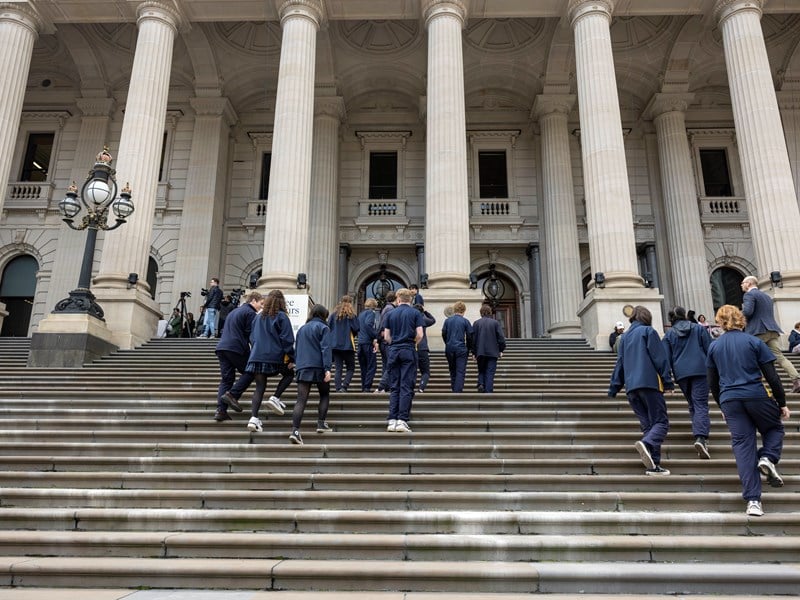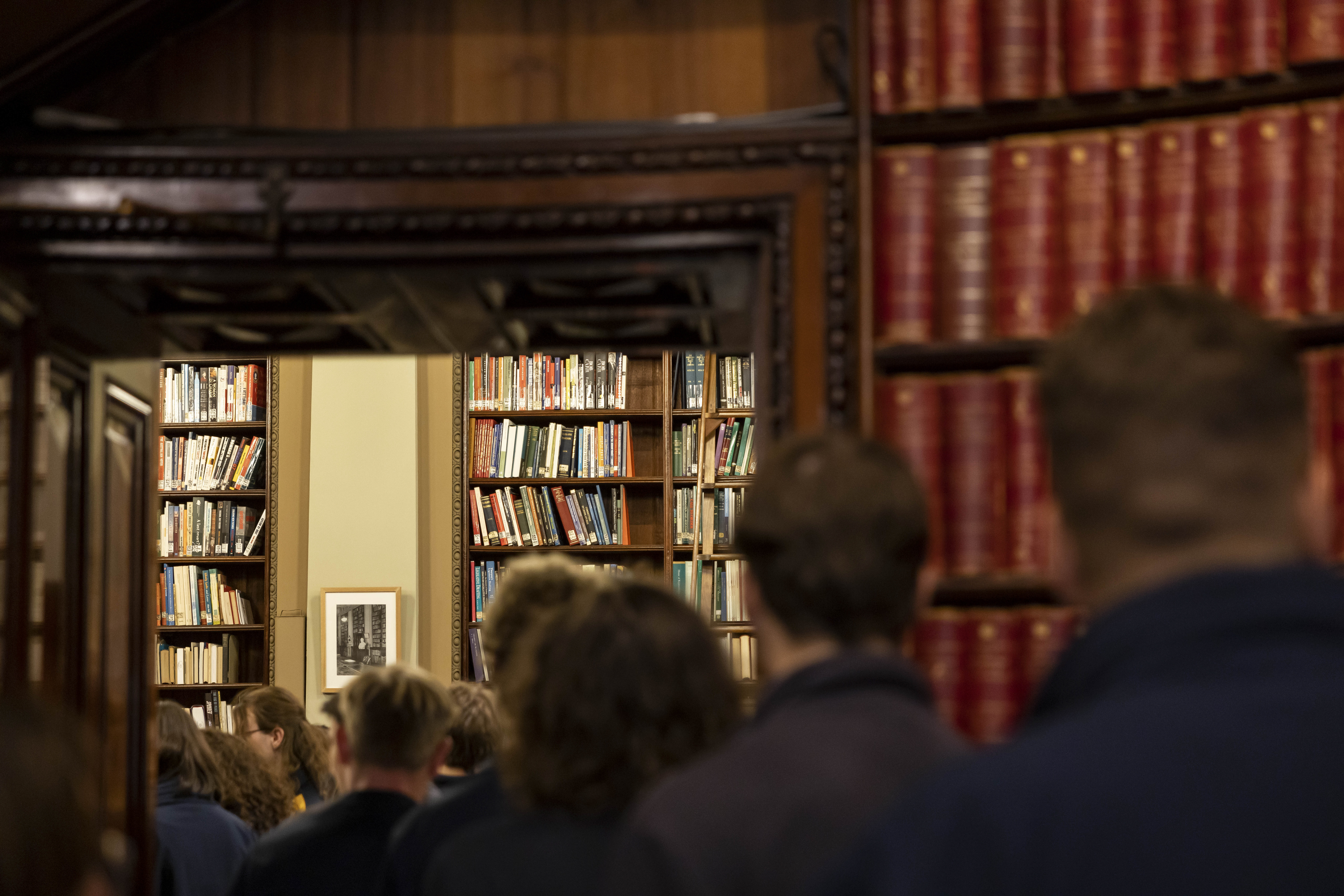Engaging with students across the state
12 June 2024

Every now and again the Community Engagement Education team engage with a range of schools and universities to trial new programs and experiences. This blog post provides an overview of some of our recent engagements and the different resources that were used.
If you have questions on how you might replicate these experiences in your classroom, make sure to reach out for some support education@parliament.vic.gov.au
Unversity of Melbourne - Pre-service early years and primary teachers
In March, we were invited to attend the University of Melbourne to share some strategies for teaching civics and citizenship with primary and early years pre-service teachers. After exploring the structure and functions of parliament with the students, we discussed ways in which they could encourage students to participate in authentic civic engagement and easily build in civic processes to their lessons. Part of the conversation was the theoretical background to the resources available on the Teach and Learn page, and importantly, an opportunity for the pre-service teachers to experience using some of these resources for themselves. One of these activities including playing with our Three levels of government flashcards, prompting the students to consider the various ways in which it could be altered to suit their classroom and some of the extension questions they might ask. Other activities included exploring different types of representation through making decisions about what to have for dinner, and a brief mock parliamentary debate, highlighting it's simplicity and multi-purpose use in a classroom.
Beechworth Secondary College
At the end of March, VCE Politics students from Beechworth Secondary College dropped in for a visit to explore the work of MPs and some important parliamentary processes, such as representation in parliament including how members must balance and represent a wide range of constituent views, as well as the process of passing a bill through parliament. The students explored some common misconceptions around parliament, including how parliament and government are not the same, and that more often than not, members from opposing political parties actually work together and get along, despite how it might sometimes appear in the media.
Students explored representation further by taking on the viewpoint of a hypothetical constituent from our Engaging Perspectives card deck and considering how they might respond to a particular topic, their reasons why, and how as an MP they may incorporate this constituent's concerns.
Deakin University - Pre-service English Teachers
In early April, we welcomed pre-service English teachers from Deakin University, who came to parliament to explore key considerations when planning an excursion. Considerations included determining a clear purpose for the excursion, the importance of visiting the excursion site beforehand first where possible first, preparing students for the excursion (including preparing neuro-diverse students through the use of social stories) and how to link learning both on the excursion and back in the classroom. Students started with some engagement on the steps, including creating a poem on the front steps with a series of prompts, and trialled some question cards, where the emphasis was interacting with the building in unique ways.
Now in its third year, the visit models for pre-service teachers different ways to engage with cultural institutions as part of the classroom; as part of their studies the students are asked to consider how to incorporate learning opportunities from outside of the classroom. The pre-service teachers are able to test their ideas, ask questions, and hopefully experience some different learning opportunities that they can incorporate into their assignments.

Altona College
At the end of April, Year 9 students from Altona College came to parliament to explore the concepts of representation and democracy. Groups also visited the Old Treasury Building (some before and some after visiting Parliament House), the students encouraged to reflect on how their understanding of democracy changed after the two experiences.
The experience began with students sharing their understanding of democracy; what democracy looks like in Australia and how it has changed over time. They reflected on what they learnt through the exhibitions at Old Treasury Building, about Australia’s democratic history. Students explored the Federation of Australia and Victoria’s independence from New South Wales, key moments in Victoria’s history including the Gold Rush, the significance of miners' rights on the gold field and the Eureka Stockade, Australia’s involvement in the war (with a focus on the role of women, the conscription debate and referendum), and significant protests in Melbourne’s history.
At parliament, students explored the role of Members of Parliament as representatives of the people, a key part of Australia’s and Victoria's democratic practices. Given that the students were all under 18, an important part of this experience was an opportunity to considered the various ways in which people can participate in democracy and have their voices heard, other than voting in elections. Using the activities in our Action and Influence teacher guide, the students analysed the effectiveness of a range of actions, and discussed how the scale, pace and direction of an action can influence effectiveness to bring about change.
Centre for Higher Education Studies
Two groups of students, as part of the inquiry units offered at Centre for Higher Education Studies, have visited Parliament House, to explore research skills and parliamentary debates.
The first group of students, completing the VCE Extended Investigation study were working on their inquiry topics and starting to think about what research they would need to conduct to answer thier key questions. The focus of the session was useful research skills and strategies, therefore students had the opportunity to hear from a range of parliamentary staff who complete research as part of their day-to-day work. The staff spoke about their research, both at parliament and in other parts of their careers, some of the types of research they do, and how they go about research, including getting started, organising their findings and how to write it up. Staff spoke about the different types of research they do, for instance for Members of Parliament, education resources, publications, briefs for bills and processes and precedents.
The second group of students in Year 10, were starting to explore issues and debating. Students explored parliamentary debates and speeches in the chamber and they considered what would make for a memorable speech. In preparing for writing their own speeches, students gained insights into the preparation of speeches, how research helps, and the importance of standing orders are used to maintaining order and expectations in the chamber. Students then put their knowledge into practice by participating in a mock parliamentary debate in the Legislative Council.